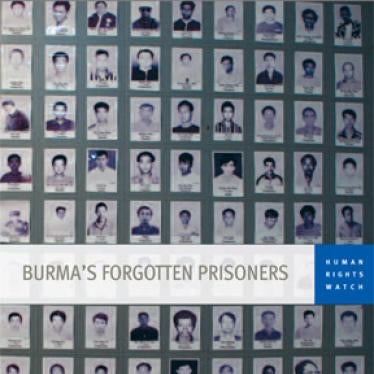(New York) - The merging of Burma's largest government-controlled social welfare organization into the army's recently formed political party is clear evidence that the planned 2010 elections will not be legitimate, Human Rights Watch said today.
On July 6, the military government permitted the mass-based Union Solidarity and Development Association (USDA), with more than 24 million nominal members nationwide, to dissolve itself and transfer its assets and offices to the Union Solidarity and Development Party (USDP). The USDP was formed by Prime Minister Thein Sein and 26 senior military officers and ministers on April 29, when all resigned their military commissions in order to contest elections scheduled for sometime in 2010. It is not known if all USDA membership lists will also be transferred to the USDP.
"The morphing of Burma's largest mass-based organization with the military's political party is a brazen if predictable distortion of the electoral process," said Elaine Pearson, acting Asia director at Human Rights Watch. "The future of military rule is being shamelessly scripted and played out before our eyes."
Burma's military government formed the USDA in September 1993 and registered it as a social welfare party in order to skirt restrictions on civil servants being members of political parties. The publicly stated aims and objectives of the organization were exactly the same as those of the ruling State Peace and Development Council (SPDC). In the past 17 years, the USDA has recruited between 24 and 26 million members, often using coercive or corrupt methods such as ordering civil servants and all teachers to join, registering high school students without their knowledge, and intimidating whole communities to sign up en masse at government orchestrated rallies. USDA branches, present in every township (sub-district administrative units), are reportedly now being re-branded as USDP offices.
Human Rights Watch said the military junta has long used the USDA for partisan political purposes. Mass demonstrations by USDA members have been conducted throughout the country since the mid-1990s, where members give speeches denouncing the political opposition, the United States, the International Labor Organization, and extolling the virtues of the SPDC. The USDA's main patron is Burma's Senior General Than Shwe. Its secretary general is the minister for agriculture and irrigation, former army general U Htay Oo.
The USDA was implicated in violent attacks on Aung San Suu Kyi, a leader of the opposition National League for Democracy, in 1996 and 1997. It led mob violence against a National League for Democracy motorcade in the town of Depayin in May 2003, which left scores dead. As documented by Human Rights Watch, during peaceful demonstrations in August and September 2007, USDA cadres were used to harass and intimidate protestors and were part of the security forces' violent crackdown on Buddhist monks on September 26-28, 2007.
The USDA has also been involved in local development projects, small business investment, training of civil servants, teachers, and journalists, building roads, and rehabilitating local infrastructure, thereby extending its reach into broad facets of Burmese life and propagating the ideals and aims of the military, or Tatmadaw. Despite its nominal mass membership, the association has little esteem in Burmese society, being seen as a less aggressive arm of the SPDC. The association is derogatively referred to in Burma as chang-puek, which is a Burmese play on words for development and iguana, to call the USDA a "slow-moving beast."
"For nearly two decades, Burma's military has carefully manipulated society by creating a social organization to ensure extensive local coercive capacity ahead of the 2010 polls," Pearson said. "The new USDP behemoth can now marginalize any semblance of an opposition, making participation by other parties and opposition figures even more difficult."
Since electoral laws for the promised 2010 polls were released in March 2010, more than 42 political parties have registered, including some smaller ethnic parties, and the National Unity Party, which has close ties to the military and is the transformed former ruling socialist party. The Political Party Registration Law prohibits parties from having as members those who are currently serving a prison term or detention order, which compelled the National League for Democracy not to re-register their party, as it would have meant expelling Aung San Suu Kyi and more than 430 party members who are still in prison. More than 2,100 political activists, artists, journalists, and human rights defenders remain in Burmese prisons ahead of the elections. Human Rights Watch's campaign, "2100 in 2010: Free Burma's Political Prisoners," aims to increase international awareness and pressure for the release of all political prisoners in Burma before the elections.
Human Rights Watch repeated its call for intensified international pressure on the Burmese government ahead of the elections, including the immediate release of all political prisoners, the start of substantive talks between the military and the opposition, and a genuine process of national reconciliation. Concerned governments should work together to strengthen targeted financial sanctions on the military leadership, selected military business, and close business associates of the military junta, and press for the United Nations Security Council to impose an arms embargo. Human Rights Watch also urged states to support the creation by the UN General Assembly of a Commission of Inquiry into allegations of war crimes and crimes against humanity perpetrated by all parties during the course of Burma's ongoing civil conflicts.
"Even Burma's main backers China, India, and Russia are probably dumbstruck by the shameless manipulation of these elections," Pearson said. "Staying mute as this mockery of democracy proceeds will only damage their international reputations."







